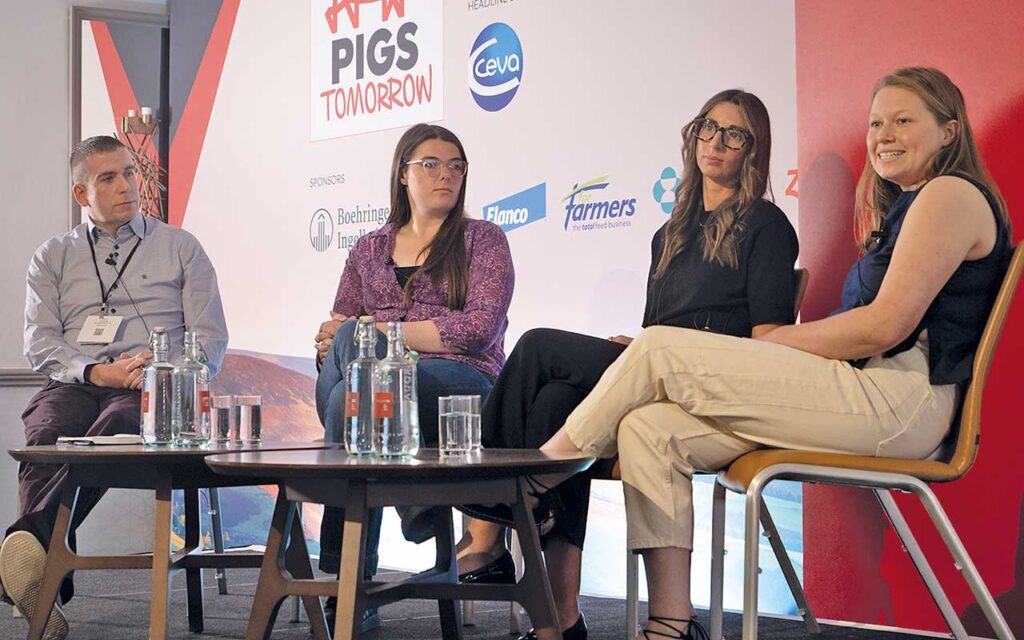A common theme throughout the two-day Pig Tomorrow conference in May was the central importance of people to delivering on all of aspects of pig production – from unit performance to pig welfare and sustainability.
Of course, linked to this is the ongoing challenge of attracting and keeping quality staff, which was a major topic on day two.
Happy workers
Start by stopping. This was the powerful opening message from neuropsychologist Dr Stephanie Fitzgerald, health and wellbeing consultant at Soyo Ltd, who firmly believes we should be healthy and happy at work.
When things are busy and stressful, it is vital to take a pause, if only briefly. During an inspirational presentation, she shared research showing that 88% of employees care more about what they feel at the end of the day than what they are paid.
“We need to weave wellbeing into the fabric of our businesses,” she said.
Pig producers do not need to spend money or buy an app. The health and safety policies and procedures that are part of farming businesses mean they already have the framework and skillset to discuss health and wellbeing, and make it the norm.
“Managers need to start talking about health issues as safety issues,” said Stephanie, adding that physical and mental health issues can both create risks to safety.
Using case studies, she showed how changing the culture of a business starts by making ‘one small thing 1% better’. “Aim for gradual improvement,” she said.
Audience suggestions for a better workplace included making sure work breaks are protected, saying ‘thank you’ and checking in to ask how colleagues are. She refuted the assumption that men do not want to open up, explaining that they often need to be asked a direct question about how particular aspects of work are going.
Young Guns inspire
Recruiting the next generation, sustainability and reputation were among the topics explored by an equally inspiring panel of Young Guns, whose energy, eloquence and commitment to the pig sector really shone.
The three panellists all came into the pig industry by chance. Toni Bagguley, Pilgrim’s Europe agricultural trainee, switched from studying law to agriculture after working for her dad on a pig farm for the summer.
Emma Wormington, key account manager at Zoetis, worked in ruminant pharmaceuticals until a great mentor introduced her to pigs. For Clementine Milton, head of farrowing at Crockway Farms, the path began with an agriculture GCSE, which – highly unusually – was offered at her school.
Clementine said her number-one priority for the future of the industry is standardised agriculture and food lessons in primary and secondary schools. “Children would then go home and tell their parents, too,” she said.
Panel chairman Shane McAuliffe, a pig farmer in Ireland, pointed out that farming is already taught as a subject in Irish secondary schools.
Toni highlighted the work of Ladies in Pigs volunteers in talking to primary school children about agriculture and pork, and going to careers events.
She added that they need more volunteers – men and women – to extend this to more schools. Showing schoolchildren a pig farm digitally, through Farmer Time, is another valuable communication route.
“We also need to show people that there is more to the industry than working on a pig farm,” Toni said.
Emma agreed there is a need to raise the profile of all the technology and innovation in what is a very detail-oriented industry. “If everyone in the room went to a school in their home town or village, think how many people we would reach,” she said.
Toni’s top priority for the industry is to make sure everyone enjoys their job, in a pleasant work environment, with good management.
The panel discussed what can be done to communicate all these positive messages about pig farming, including around sustainability.
Shane highlighted the benefits of using social media, despite having experienced negativity. Clementine added: “The public perception is negative about indoor farming, so I try my hardest to explain it to people who know nothing about it. I’m incredibly proud of what we do.”




